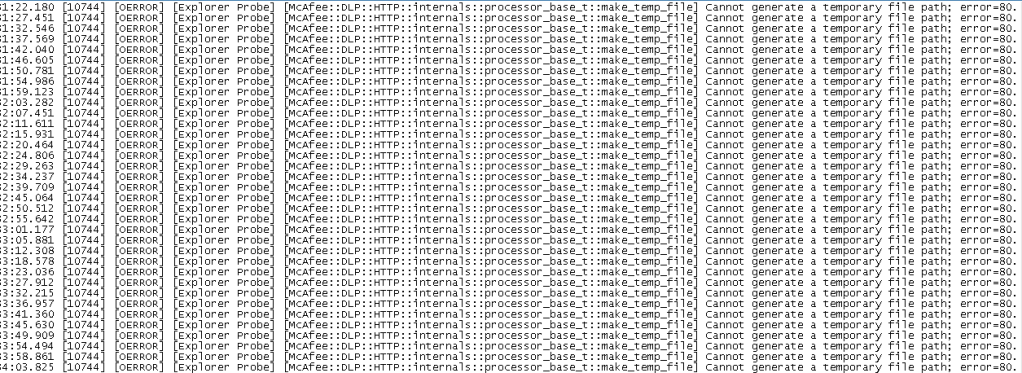IE & The Case of the 65,535 temp files
Posted by William Diaz on October 23, 2018
This is a bit old but I came across the screenshots I captured on one of my soon-to-be-retired workstations and I was reminded that I forgot to document this one.
The problem came about as a run-of-the-mill IE performance “very slow” escalations. Killing IE and restarting it did not resolve and it would consistently happen each time. After connecting to the workstation, I fired up Process Monitor and captured about 30 seconds worth of activity and then stopped the capture. I applied a filter for iexplore.exe and began to scroll down the almost 1 million operations generated in that short capture: A sore thumb stood out. Almost all the operations being performed by IE were file operations specific to temp files in the C:\Users\username\AppData\LocalLow\DLPTemp directory. Looking in that directory, I could see thousands of htp*.tmp files. In this directory was an additional sub-folders named Logs that contained a single log file, HDLP_IE.log. Opening it up revealed what seemed to be the problem: [10744] [OERROR] [Explorer Probe] [McAfee::DLP::HTTP::internals::processor_base_t::make_temp_file] Cannot generate a temporary file path; error=80
A sore thumb stood out. Almost all the operations being performed by IE were file operations specific to temp files in the C:\Users\username\AppData\LocalLow\DLPTemp directory. Looking in that directory, I could see thousands of htp*.tmp files. In this directory was an additional sub-folders named Logs that contained a single log file, HDLP_IE.log. Opening it up revealed what seemed to be the problem: [10744] [OERROR] [Explorer Probe] [McAfee::DLP::HTTP::internals::processor_base_t::make_temp_file] Cannot generate a temporary file path; error=80
 Unless you have deep-dived into Windows file system, its not common knowledge that Windows places a limitation on the number of temp files (.tmp) that can be generated into a single folder directory. That limitation is 65,535, and that limitation had already been reached.
Unless you have deep-dived into Windows file system, its not common knowledge that Windows places a limitation on the number of temp files (.tmp) that can be generated into a single folder directory. That limitation is 65,535, and that limitation had already been reached.
 The issue was specific to only a handful of users, mostly those working in large document databases via the browser. The McAfee DLP plugin for IE “mirrors” these files as .tmp files for content analysis. Normally, these files should be cleaned up by DLP agent and for whatever reason they this was not working. Some quick research pointed to the cause and McAfee lays out the issue here https://kc.mcafee.com/corporate/index?page=content&id=KB84595&actp=null&viewlocale=en_US.
The quick fix was to manually delete all the temp files in the directory until workstations could be updated to latest DLP Endpoint.
The issue was specific to only a handful of users, mostly those working in large document databases via the browser. The McAfee DLP plugin for IE “mirrors” these files as .tmp files for content analysis. Normally, these files should be cleaned up by DLP agent and for whatever reason they this was not working. Some quick research pointed to the cause and McAfee lays out the issue here https://kc.mcafee.com/corporate/index?page=content&id=KB84595&actp=null&viewlocale=en_US.
The quick fix was to manually delete all the temp files in the directory until workstations could be updated to latest DLP Endpoint.

Leave a comment